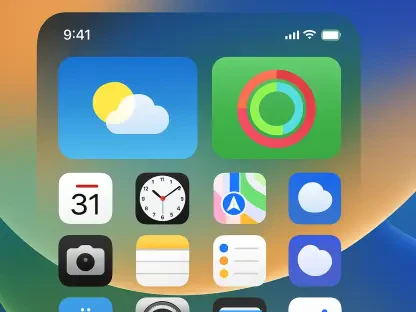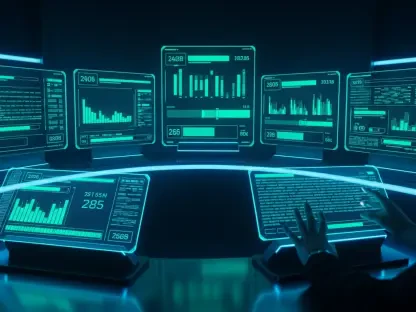In recent years, the healthcare industry has experienced a seismic shift brought on by the innovative use of mobile technology. As the digital era permeates every aspect of daily life, healthcare has not remained untouched; mobile apps have emerged as a potent tool, revolutionizing the way healthcare is delivered and managed. With PricewaterhouseCoopers forecasting mobile healthcare application revenue to reach a staggering $23 billion by 2017, it’s clear that these applications are more than a passing trend—they are an essential element in the evolving landscape of healthcare. This article delves deep into the transformative power of mobile apps, unveiling their impact across the healthcare ecosystem, and sheds light on how they are reshaping care delivery for professionals, management, and patients alike.
The Adoption and Integration of Mobile Technology in Healthcare
Healthcare professionals are rapidly adopting mobile technology to enhance patient care and operational efficiency. The sight of physicians toggling between patient charts on tablets and nurses referencing medication dosages on smartphones has become commonplace. These mobile devices have become crucial tools, ingrained in the daily workflow and at the very heart of modern medical practice. Notably, a survey by Lippincott Williams & Wilkins has revealed that 71% of nurses use smartphones for work-related tasks, marking an indelible change in how healthcare is administered. With healthcare apps, a wealth of medical information is within arm’s reach, ensuring that caregivers can make swift, informed decisions that are vital for patient outcomes.The adoption of mobile technology goes beyond ease of access to information; it fosters a collaborative environment where sharing and communication are instantaneous. Whether within the hospital or across different healthcare facilities, professionals can now connect and consult each other with ease, leading to better coordinated care and ultimately, better patient outcomes. The integration of these technologies is not a mere convenience—it is a fundamental enhancement to the practice of medicine.
Impact of Mobile Apps on Healthcare Providers and Patients
Healthcare providers are witnessing an evolution in patient care, catalyzed by the rise of mobile apps. These applications offer providers immediate access to patient records, test results, and other critical data, facilitating real-time decisions that can be life-saving. As clinics and hospitals continue to digitize patient records, mobile apps become the conduits for the swift flow of information, bridging the gap between disparate data points and enabling comprehensive care.For patients, mobile apps serve as the linchpin in their healthcare journey, offering a degree of involvement that was previously unattainable. These apps assist with medication reminders, schedule hospital visits, and even provide platforms for direct communication with healthcare providers. By engaging patients as active participants in their health management, mobile apps contribute to improved treatment adherence and a deeper understanding of their health condition, which in turn could lead to better health outcomes.
Advantages for Healthcare Facilities and Executives
Mobile technology offers multifaceted benefits for facility management. Applications that focus on resource tracking—such as the status of medical equipment, the availability of beds, and even energy consumption—empower managers to maintain operational efficiency. In emergencies, the swift allocation of resources can be both critical and challenging; mobile apps alleviate this issue by offering real-time data that helps manage such scenarios effectively.Hospital executives, on the other hand, harness the power of mobile apps for seamless administrative workflow. In an environment where administrative tasks can be as complex as the medical decisions themselves, mobile apps offer solutions that streamline processes such as billing, insurance filings, and patient registration. By digitizing these aspects, executives can better allocate human and financial resources to areas that directly impact patient care, making operations not just more efficient but also more patient-focused.
The Necessity of Tailored and Secure App Development
The development of mobile apps for healthcare emphasizes the need for a user-centric approach. Apps must be intuitive and adaptable across multiple platforms, ensuring they meet the distinct needs of various healthcare professionals. Native app development, which tailors applications specifically for individual operating systems, is crucial for achieving this. By focusing on the end-user experience, developers can create apps that cater to the unique roles and responsibilities of users within the healthcare setting.When it comes to healthcare applications, security and privacy are paramount. With legislation like the Health Insurance Portability and Accountability Act (HIPAA) enforcing strict standards, developers must ensure that healthcare apps protect patient data with the highest level of security. Breaches of sensitive health information can have dire consequences, both legally and for patient trust. Consequently, developers must take a stringent approach to data protection, implementing robust encryption and secure data storage methods to maintain the privacy that patients expect and the law requires.
Market Prospects and the Role of App Developers
The future exudes optimism for mobile health apps, with projections pointing towards continuous growth and a thriving market. Surveys from entities like the PricewaterhouseCoopers Health Research Institute concretize the positive outlook, suggesting a landscape ripe with opportunities for developers and marketers alike. For healthcare organizations looking to step into the realm of mobile apps, choosing the right team of developers is a decision of paramount importance. Not only must these professionals be adept at technical execution, but they must also possess a deep understanding of the healthcare environment to ensure that the end product not only works well but also works well within the unique context of healthcare.The transformation of healthcare through mobile apps cannot be overstated. They streamline administrative tasks, provide critical health data at the fingertips of professionals, and engage patients in their care like never before. However, to capitalize on these benefits, healthcare providers must invest in building applications that are not only functional and user-friendly, but also meet the stringent requirements for security and privacy. As healthcare continues to embrace the digital revolution, mobile apps will undoubtedly continue to play a central role in shaping a more effective and efficient healthcare system for all stakeholders involved.









